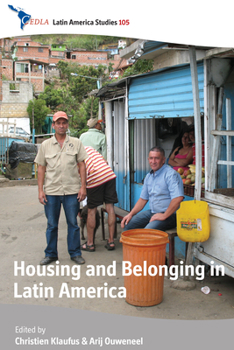Housing and Belonging in Latin America
The intricacies of living in contemporary Latin American cities include cases of both empowerment and restriction. In Lima, residents built their own homes and formed community organizations, while in Rio de Janeiro inhabitants of the favelas needed to be "pacified" in anticipation of international sporting events. Aspirations to "get ahead in life" abound in the region, but so do multiple limitations to realizing the dream of upward mobility. This volume captures the paradoxical histories and experiences of urban life in Latin America, offering new empirical and theoretical insights to scholars.
Format:Hardcover
Language:English
ISBN:1782387404
ISBN13:9781782387404
Release Date:May 2015
Publisher:Berghahn Books
Length:344 Pages
Weight:1.39 lbs.
Dimensions:0.8" x 6.0" x 9.0"
Customer Reviews
0 rating





